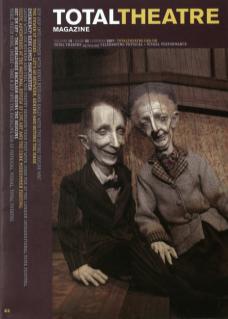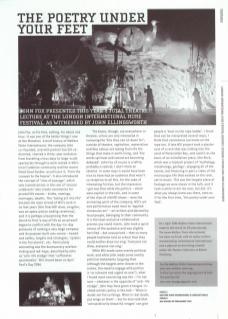John Fox, on his feet, talking, for about one hour. It was one of the better things I saw at the Mimefest. A brief history of Welfare State International, the company John co-founded, and with partner Sue Gill co-directed, charted a thirty-year evolution from travelling circus days to large-scale spectacles through to work rooted in WSI's local Cumbrian community and the recent Dead Good Guides: as John put it, 'from the caravan to the hearse'. It also introduced the concept of ‘rites of passage', which sets trained artists in the role of 'secular celebrants' who create ceremonies for pivotal life events – births, namings, marriages, deaths. This ‘taking art into life' became the main strand of WSI's work in its last years (the final WSI show, Longline, was an opera and an ending ceremony), and it is perhaps unsurprising that the desire to find ‘a way of life as an artwork' began to conflict with the day-to-day pressures of running a very large company and its purpose-built arts centre – health and safety, targets and strategies, 'spiders in the fire alarms', etc. Particularly enervating was the bureaucracy and boxticking and red-tape, described by John as 'anti-life stodge' that 'suffocates spontaneity'. WSI closed down on April Fool's Day 2006.
The boxes, though, are everywhere – in theatre, critics are only interested in reviewing the 'bits they can sit down for'; outside of theatre, capitalism, materialism and New Labour are taking from life the things that make it worth living, and ‘the words spiritual and sacred are becoming debased'. John Fox of course is a leftie; probably a radical; I don't think an idealist. In some ways it would have been nice to have had an audience that wasn't so receptive to all this, for the sake of interesting friction, but the impression I got was that while the politics – which were explicit in the talk, and in some of the clips of old WSI shows – were the animating spirit of the company, WSI's art and performance owed most to 'applied vernacular art' – art written and devised by local people, belonging to their community. It is the least exclusive collaborative process you could invent. John took a quick census of the audience and was slightly horrified – but unsurprised – that so many people had been told at school that they could neither draw nor sing: 'Everyone can draw, everyone can sing.'
While WSI made some overtly political work, and while John made some overtly political statements (arguing that although the targets were clearer in the sixties, the need to engage with politics is 'as relevant and urgent as ever'), what I found most convincing was the – I'm not sure – whatever is the opposite of 'anti-life stodge'. John may have given a tongue-in-cheek artistic policy in the talk – 'When in doubt set fire to things. When in real doubt, put wings on them' – but he also said that 'extraordinarily beautiful images' can give people a 'knot on the rope ladder'. I think that can be interpreted several ways; I think that ceremonies are knots on the rope too. A late WSI project took a plaster cast of a rock that was sinking into the sand of Morecambe Bay, and used it as the basis of an installation piece, One Rock, which was a triptych project of 'mythology, morphology, geology', engaging all of the senses, but featuring in part a video of the microscopic life that existed on the rock, set to music. This was the longest piece of footage we were shown in the talk, and it took a while to win me over, but did. It's what you always knew was there, seen as if for the first time, 'the poetry under your feet'.

